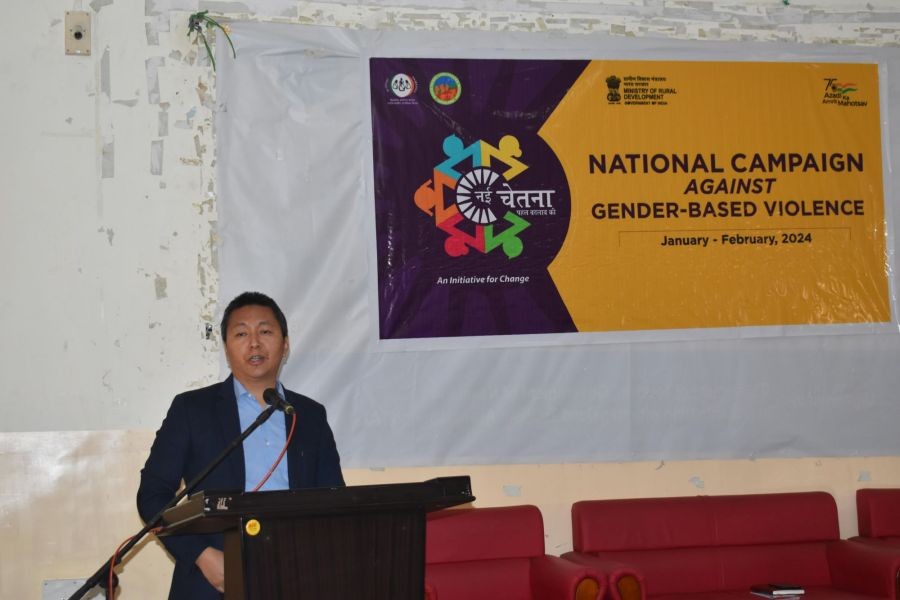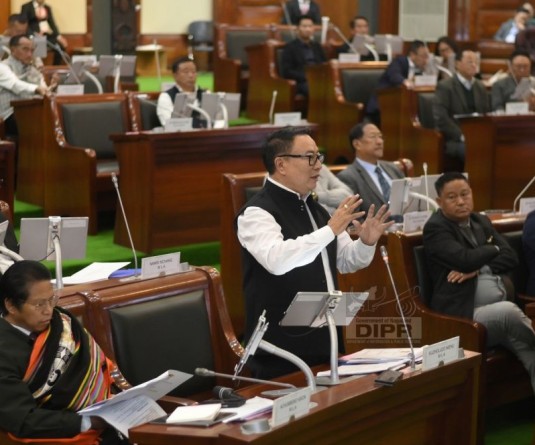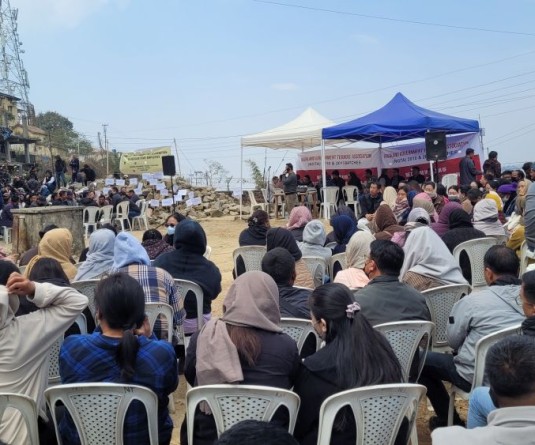Project Director DRDA Dimapur, Moa Sangtam speaking at the stakeholders’ workshop on gender campaign in Dimapur on February 13. (DIPR Photo)

Stakeholders’ workshop on gender campaign held in Dimapur
Dimapur, February 13 (MExN): Out of 193 countries under the United Nations, 21% of prime ministers are women, indicating an emerging trend of women’s leadership, however, Nagaland is still struggling with women's representation, highlighted Moa Sangtam, Project Director (PD)-cum-District Mission Manager (DMM) at the District Mission Management Unit (DMMU), District Rural Development Agency (DRDA), Dimapur, on Tuesday.
There is a need to focus on changing the mindset of the people, he maintained, addressing the stakeholders’ workshop on gender campaign held in Tourist Lodge, Dimapur on February 13.
Accordingly, Sangtam noted that the workshop aims to sensitise the rights of women and make people aware of gender-based discrimination and violence.
He also highlighted the work carried out by the National Rural Livelihood Mission (NRLM) to sensitise the public about gender discrimination, including different campaigns, capacity training, and orientation programmes.
Double discrimination for women with disabilities
Meanwhile, representing the State Commissioner of Persons with Disabilities, Ashe Kiba maintained that women with disabilities face a double layer of discrimination, especially those with hearing, speech impairments, visual impairments, and intellectual disabilities.
They face discrimination based on both gender and disabilities and are often targeted by those who exploit vulnerabilities, she noted. To this end, Kiba asserted that gender equality is not just a distant dream but a resounding call for equal rights, opportunities, and access to resources for every individual.
She also dwelt on the Rights of Persons with Disabilities Act, 2016, which is a legal framework dedicated to safeguarding the rights of PwDs, with specific provisions for women.
Likewise, K Ela, Director, Prodigals Home maintained that one of the most marginalised women in our society are women with disabilities. Maximum abuse to PwDs comes from the primary caregiver, she shared, urging the people to be aware of such incidents.
Ela also stressed the importance of collectively fighting against gender-based violence. She opined that even though women in Nagaland face discrimination and violence, many are not reporting it to the competent authority due to fear of discrimination from the stigma by society and family.
Those who abuse drugs and alcohol are one of the softest targets for abuse, she added. Hence, she urged womenfolk to be courageous and to speak out. She also encouraged the gathering to report any incident of domestic abuse of women by calling 181, a toll-free number.
In addition, Ela said that people need to be sensitised about the rights of women and gender-based discrimination and violence.
Collective effort
As February 13 is celebrated as National Women’s Day, the workshop on gender campaign is apt, maintained Azungla James, Director, Sisterhood Network, Dimapur. She also shared that Sustainable Development Goals (SDG) 5 is to achieve gender equality and empower all women and girls.
To achieve the goals, there should be a collective effort to uplift women, and gender awareness campaigns are imperative, she added. She further opined that gender equality is not only a fundamental human right but a necessary foundation for a peaceful, prosperous, and sustainable world.
The Director also highlighted the systematic barriers hindering gender justice in Naga society exist due to the patriarchal mindset, preference of sons over daughters or men over women, objections to having women at decision-making levels, domestic violence through verbal abuse, frequent mental harassments, emotional threats and controls, physical violence, and spiritual manipulations, etc.
Hence, she said that the gender campaign should be undertaken not only by women but it must be a collective campaign of both men and women. Men should campaign for their mothers, grandmothers, sisters, daughters, wives, colleagues, and girlfriends, she added.
Advocate Sangto Longchar, a representative from District Legal Services Authority Network, Dimapur, meanwhile highlighted sexual harassment of women at the workplace, a violation of their fundamental rights. As per the Sexual Harassment of Women at Workplace (Prevention, Prohibition And Redressal) Act, 2013, sexual harassment includes physical contact or advances, demand or request for sexual favors, making sexual colored remarks, showing of pornography or any other unwelcome physical, verbal, or non-verbal conduct of sexual nature, he said.
Longchar informed that any woman aggrieved can make a complaint to the Internal Complaints Committee or Local Complaints Committee set up in the workplace. Highlighting some activities of the DLSA, he said that it provides free and competent legal services to the eligible persons, organises Lok Adalats for amicable settlement of disputes, and conducts legal awareness camps in rural areas.
As per a DIPR report, the workshop was organised by NSRLM, DRDA, Dimapur, and was attended by the stakeholder departments and organisations.






